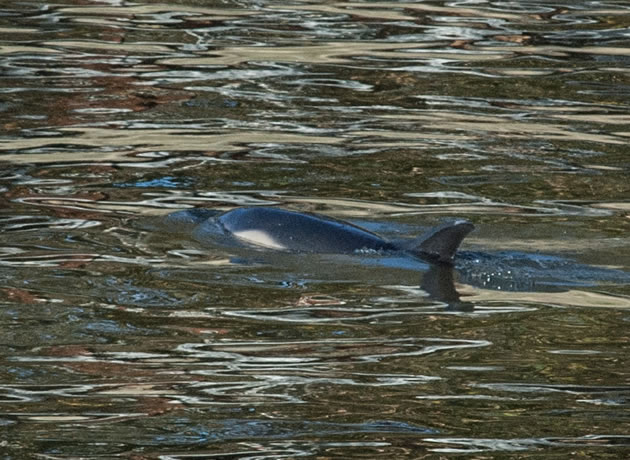'Dolphin' Sighted in Thames Near Chiswick
Spotted several times between Hammersmith and Kew Bridges

Dolphin in the Thames near Kew Bridge. Picture: Chiswick RNLI
There have been a number of sightings of what is believed to be dolphin or a porpoise on the Thames off Chiswick this Monday (30 October).
The first reported sighting was just up from Hammersmith Bridge early this morning. Video footage was played on BBC London News.
The creature appears to be making its way up river as it has subsequently been spotted at Chiswick Pier, by customers at the Bell and Crown and by the Chiswick RNLI at Kew Bridge.
The Metropolitan Police Marine Policing unit have said on Twitter, "We're aware a harbour porpoise has been spotted up at Kew. It's perfectly fine so please don't approach it as it's likely to beach itself."
Dolphin sightings on the Thames are not unusual but more rare this far up. River users often report seeing small dolphins or possibly porpoises following their boats.
Ok, I'll admit this isn't the best photo of a dolphin ever, but it's in the top 10 photos of dolphins that I've taken swimming in Chiswick pic.twitter.com/emdEGhT3dq
— Alastair Hilton (@London_W4) October 30, 2017
The BDMLR, an organisation dedicated to the rescue and well-being of all marine animals in distress around the UK has responded by releasing this statement, "As has been reported widely via the internet, there is currently a lone common dolphin in the upper reaches of the tidal Thames.
"Solitary dolphins are not uncommon around the UK coast and occasionally they will swim up rivers further inland. When this happens, their welfare can be threatened as people who are not used to seeing a marine animal may inadvertently cause it stress.
"Human interactions with wild dolphins may also break the law as it is illegal to disturb or harass dolphins in UK waters – in recent years this has resulted in criminal conviction of people who were seen harassing a dolphin off the coast. There is also the danger that the animal may be frightened further up the river, or in the worst case, to actually strand.
"Given the threat of harm posed to this solitary dolphin in London, as well as to the people interacting with it, BDMLR is urging people not to enter the water with it or to approach it on any form of craft, powered or otherwise. We appreciate how unusual and exciting it is to have the opportunity to see these beautiful creatures from our shores, but please do watch this one responsibly from land.
"Interacting with dolphins also runs the risk of zoonotic disease transfer, which is the passing of contagious diseases between humans and dolphins. There are known cases in the UK where people have been infected by dolphins with pneumonia and meningoencephalitis, and disease transmission can work both ways.
"We would rather not have to rescue this dolphin, or herd it back out to sea as it would be less stressful for it to make its own way back out to open waters. It is being monitored and we, along with the RSPCA, PLA, ZSL and police will take whatever action is necessary to ensure its safety.
"Here are three actions you can take to help protect this dolphin:
If you want to see the dolphin, please don’t get in the water with it – instead, watch the dolphin from land.
Share this information to help educate people about responsible dolphin watching and to discourage individuals from getting in the water with the dolphin.
Please report any incidents of disturbance of the dolphin via our hotline on 01825 765545 or to the police.
To help us keep track of this dolphin, sightings can be reported online at ZSL’s Thames Marine Mammal Survey Site by clicking here."
An RSPCA spokesman added: "The RSPCA has been made aware of a dolphin which has been spotted in the River Thames in the Putney area of London.
"We are liasing with British Divers Marine Life Rescue (BDMLR), who are monitoring the mammal, and are available to assist their teams if necessary.
"Anyone who is concerned for the welfare of an animal should contact the RSPCA's 24-hour emergency hotline on 0300 1234 999 for help or advice.
"Anyone with concerns regarding a specific marine animal can contact British Divers Marine Life Rescue directly on 01825 765546 or 07787 433412 (out of hours)."
November 3, 2017